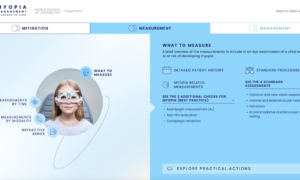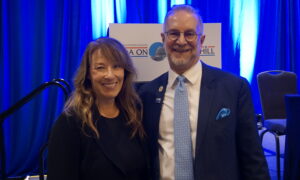January 15, 2024
By Dwight Barnes, OD, FIAOMC, IACMM
By creating a culture of myopia management in our office, we have seen exponential growth in this specialty, allowing us to help hundreds of patients. It also helps us to reduce our dependence on vision plans, which improves our profitability.

Photo Credit: E+, Getty Images
One of the challenges in creating a profitable myopia management clinic is “scaling up” to increase the number of these patients in your practice. While external marketing can be beneficial, I have found the most helpful strategy to be ingraining myopia management into the culture of your clinic. This requires work to educate your team, but that work is worth it as a team that fully understands the value of this specialty (both to your patients and your practice) will be more effective in communicating this service to your patients.
There are two critical components to building this culture of myopia management: 1) strategic internal marketing to generate awareness for your patients and 2) extensive education for your team so they understand why this specialty is so beneficial to patients and how it can help your practice grow.
Patients See Myopia Management Signage Everywhere
In the case of myopia management, the goal of internal marketing is not to “sell” this service to your patients. The goal is to generate awareness regarding the myopia epidemic and ensure that any patient in your office becomes aware that you are the expert in treating these patients. A patient of your office should not have to find out from a friend that there are options to slow myopia progression; they should find out from your office! My goal in this regard is to make it virtually impossible for a patient to navigate an encounter at my office without becoming acutely aware of myopia control as a specialty and seeing that our office is the local expert in this area.
We achieve this through posters in the pre-test areas and the exam rooms. Even if a patient would not benefit from this service, they may have a friend or family member who would. We also have an area where we post photos (with permission) of some of our successful young orthokeratology patients. This is always a good conversation starter, as patients will ask why these pictures are on the wall. This also can help young patients who may be intimidated by the concept of OrthoK because they can see patients around their age who have been successful with it.
We have also created our own myopia management brochures that explain progressive myopia and the available treatments in simple terms. We have created a logo and branding for our myopia clinic that is separate from our overall practice logo, allowing us to have consistent branding and messaging throughout the office for the specialty. Treating your specialty as a “clinic within a clinic” helps to generate the appropriate focus needed to concentrate on its growth. When discussing myopia management with parents, our doctors focus on the medical importance of treatment. It is essential to find the sweet spot of informing parents of the medical consequences of progressive myopia without engaging in fearmongering.
Designate a Myopia Team Leader
Several years ago, we created the Myopia Clinic Coordinator position, which has been one of the most important innovations for our Myopia Control Clinic. This person takes the lead on patient education, staff education, and discussing fees with potential myopia management patients. While we want every team member to be able to answer basic questions about myopia, it is not necessary to have everyone on our staff be an expert on the subject. However, it is possible to train one team member to have a more in-depth understanding of this specialty so they can provide effective patient/parent education.
To train our Myopia Clinic Coordinator, we used a combination of one-on-one coaching, a list of “frequently asked questions,” and training information from the American Academy of Orthokeratology and Myopia Control (AAOMC). This team member is helpful because sometimes our busy clinic schedule does not allow enough time for an in-depth discussion of myopia control. In these instances, we can start the conversation and hand the patient off to our coordinator.
Even though not every team member can be an expert, it is crucial to have some general knowledge throughout your team. We accomplish this through periodic staff education from me or from my Myopia Clinic Coordinator. We also ensure that our team understands the financial value of these patients to our practice. We use a system of “open book management” in our office, so our team is very aware of the benefit of these patients to our clinic. As such, these patients become “VIPs” in our practice. Myopia management tends to be more expensive than general care, and the parents of these patients often have more questions than the typical patient. Having a well-trained staff to answer these questions helps the parents feel confident in your clinic’s ability to help their child.
If you have already implemented myopia control in your clinic, I advise you to take the next steps toward growing this specialty. Undoubtedly, work is involved in creating the internal marketing and training your team, but those efforts pay off in the long run. These strategies do not have to be implemented all at once. You can gradually add them over time. It is essential to give your specialty the attention it needs to flourish. By creating a culture of myopia management in our office, we have seen exponential growth in this specialty, allowing us to help hundreds of patients. It also helps us to reduce our dependence on vision plans, which improves our profitability.
 |
Dr. Dwight Barnes attended Southern College of Optometry, where he graduated Magna Cum Laude, in 2002. After graduation, Dr. Barnes completed a residency in primary care optometry and ocular disease at the Department of Veterans Affairs in Boston, MA. He is co-owner of Cary Family Eye Care in Cary, NC, with his wife Kelly. In addition to routine care, Dr. Barnes has a passion for myopia control and orthokeratology, and he established a Myopia Control Clinic within Cary Family Eye Care to focus on helping slow progression of myopia in young patients. He is a Fellow and Board Member of the International Academy of Orthokeratology and Myopia Control (FIAOMC) and also has the designation International Academy Certification in Myopia Management (IACMM). He has lectured and written articles on various aspects of practice management and myopia management, and he provides consulting services to doctors adding/expanding myopia management services. He is currently the co-host of “The Corrected View,” which is the AAOMC’s myopia management podcast. |













